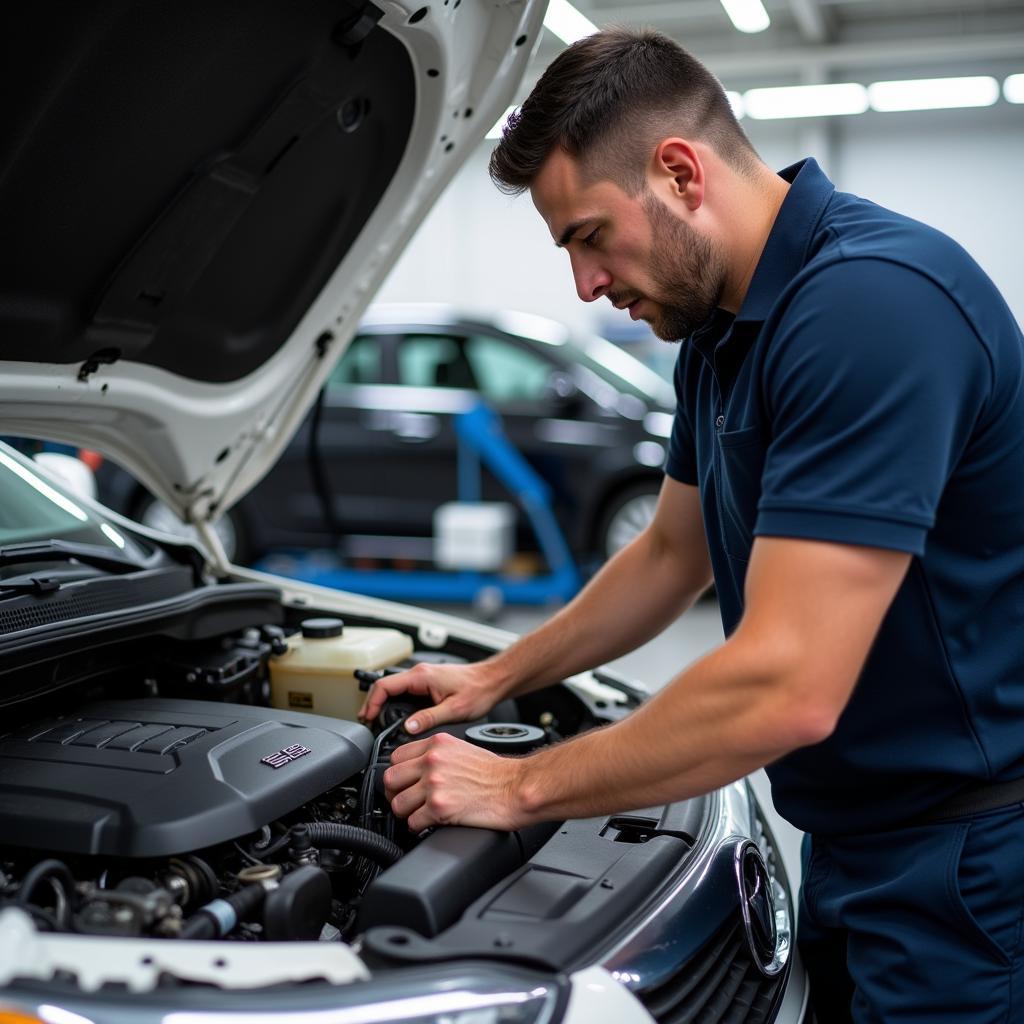What Does a Full Car Service Cover?
Owning a car offers freedom and flexibility, but it also comes with the responsibility of maintenance. A full car service is an essential part of car ownership, ensuring your vehicle remains safe, reliable, and in top condition. But What Does A Full Car Service Cover, and how often should you schedule one? Let’s dive in.
Understanding a Full Car Service
A full car service is much more comprehensive than a basic oil change. It’s a thorough inspection and maintenance procedure covering a wide range of components, from engine health to safety features. It aims to identify and address existing issues and prevent potential problems down the road.
What’s Typically Included in a Full Car Service?
A standard full car service usually encompasses the following checks and replacements:
- Engine Oil and Filter Change: The lifeblood of your engine, fresh oil, and a new filter ensure smooth operation and prevent premature wear.
- Fluid Level Checks and Top-ups: This includes coolant, brake fluid, power steering fluid, transmission fluid, and windshield washer fluid. Maintaining correct fluid levels is crucial for optimal performance and prevents overheating and other issues.
- Tire Pressure and Condition Check: Properly inflated tires maximize fuel efficiency, handling, and tire lifespan. Technicians will inspect tires for wear and tear and advise on any necessary replacements.
- Brake Inspection: One of the most critical safety aspects, your brakes are thoroughly inspected for wear and tear on pads, discs, and calipers.
- Battery Test: The battery’s health is essential for starting your car. A full car service includes a battery test to check its voltage and overall condition.
- Lights Inspection: All exterior and interior lights are checked for functionality, ensuring visibility and safety on the road.
- Air Filter Replacement: A clean air filter ensures the engine breathes properly, optimizing fuel efficiency and performance.
- Spark Plug Check (and potential replacement): Spark plugs ignite the fuel-air mixture in the engine. Worn-out spark plugs can lead to misfires, reduced performance, and increased emissions.
 Car Engine Inspection During Full Service
Car Engine Inspection During Full Service
The Benefits of Regular Full Car Services
Regular full car services provide numerous benefits:
- Enhanced Safety: Regular checks and maintenance of brakes, tires, and lights ensure your vehicle remains safe to drive.
- Improved Performance: Keeping your car in optimal condition with regular servicing ensures smooth running, better fuel efficiency, and maximized performance.
- Increased Lifespan: Regular maintenance helps prevent major breakdowns and extends the life of your car.
- Higher Resale Value: A well-maintained car with a full service history is more attractive to potential buyers, resulting in a higher resale value.
How Often Do You Need a Full Car Service?
The frequency of full car services depends on several factors, including:
- Manufacturer Recommendations: Your car’s owner’s manual will outline the recommended service intervals. It’s essential to follow these guidelines.
- Driving Conditions: Frequent city driving, towing, or driving in extreme weather conditions may require more frequent servicing.
- Vehicle Age and Mileage: Older vehicles with higher mileage may benefit from more frequent servicing.
As a general rule of thumb, scheduling a full car service at least once a year or every 12,000 miles is advisable.
Is a Full Car Service Worth It?
Absolutely. While it might seem like an additional expense, a full car service is an investment in your safety, your car’s longevity, and your peace of mind.
Choosing the Right Car Service Provider
When choosing a car service provider, consider:
- Reputation and Reviews: Look for reputable service centers with positive customer feedback.
- Experience and Expertise: Choose a service center with experienced mechanics familiar with your car make and model.
- Transparent Pricing: Ensure the service center provides a clear and detailed quote before commencing any work.
Conclusion
A full car service is crucial for maintaining your vehicle’s safety, reliability, and performance. By understanding what’s covered in a full service and scheduling regular appointments with a trusted service provider, you can enjoy a smoother, safer, and more cost-effective driving experience for years to come.
FAQs about Full Car Services
Q: What’s the difference between a full car service and an interim car service?
A: An interim car service is a less comprehensive check-up usually recommended every 6 months or 6,000 miles. It focuses on essential fluids, tire pressure, and visual inspections. A full car service is more in-depth, covering a wider range of components.
Q: How long does a full car service take?
A: A full car service typically takes around 3-4 hours, depending on the car’s make and model and any additional repairs required.
Q: Can I service my car myself?
A: While some basic maintenance tasks can be done at home, it’s recommended to leave a full car service to qualified professionals. They have the expertise and equipment to diagnose and address issues correctly.
Q: Do I have to go to my dealership for a full car service?
A: No, you are not obligated to service your car at the dealership. You can choose an independent service center as long as they are reputable and experienced.
Q: How much does a full car service cost?
A: The cost varies depending on your car’s make and model, location, and the service center you choose. It’s always best to get a quote upfront.
Need help finding a trusted car service provider in your area? Contact us via WhatsApp: +1(641)206-8880 or email: [email protected]. Our team is available 24/7 to assist you.

